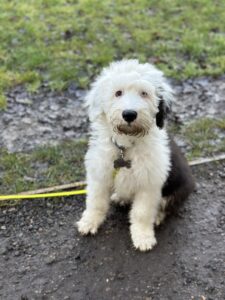The Rise of “Balanced” Dog Training in Watford
If you’ve spent any time chatting with other dog owners in Watford—whether it’s at Cassiobury Park, along Watford High Street, or at one of our dog-friendly cafés—you’ve probably heard the term “balanced dog training.”
Balanced training combines praise and treats with corrections, often using tools like prong collars, choke chains, or even shock collars. On the surface, “balanced” sounds fair—after all, it’s a bit of good, a bit of bad, right? But when you look closer, those “corrections” usually mean some form of discomfort or fear. And that’s not the kind of relationship most of us dream of having with our dogs.
What Makes Positive Dog Training Different
Positive reinforcement dog training in Watford is built on kindness, patience, and science. Instead of punishing mistakes, we reward the right choices. This creates a learning environment where your dog feels safe to try, make mistakes, and try again—without fear of what might happen if they get it wrong.
When you use positive reinforcement, you’re teaching your dog to work with you because they want to, not because they’re worried about the consequences. That motivation is powerful—it builds trust, enthusiasm, and a willingness to learn.
Training in Watford’s Real-Life Settings
Our town is full of great training opportunities if you know where to look. You might:
-
Practise recall in Cassiobury Park or Knutsford Playing Fields.
-
Work on loose-lead walking while browsing Watford Market.
-
Teach polite greetings outside the shops on The Parade.
-
Build focus with your dog in the quieter corners of Oxhey Park.
These are real-world distractions where positive training truly shines. Your dog learns to pay attention to you even when life is exciting—without needing harsh corrections.
Benefits of Positive Reinforcement for Watford Dogs
Positive reinforcement is more than just being “nice.” It’s a highly effective, evidence-based approach with proven benefits:
-
Faster learning – Dogs are motivated to try new things and repeat successful behaviours.
-
Happier dogs – Confidence grows when they know good choices bring good outcomes.
-
Better relationships – Trust deepens when your dog sees you as a safe, reliable guide.
-
Lasting results – Behaviours learned through positive methods tend to stick because they’re built on enjoyment, not fear.
The Problem With “Balanced” Training
While “balanced” methods might give you quick results, they often rely on aversive techniques—things the dog wants to avoid. That can mean they obey out of fear rather than understanding.
Dogs trained this way may look calm, but sometimes that’s “shut down” behaviour. You might see:
-
Avoiding eye contact.
-
Hesitation to try new behaviours.
-
Reduced playfulness.
-
Slower learning over time.
These aren’t signs of a confident, happy dog—they’re signs of stress.
Why Positive Training Works Best in a Busy Town Like Watford
Life in Watford can be stimulating for dogs—bustling streets, busy parks, passing buses, children playing, and other dogs everywhere. Positive reinforcement equips your dog to handle these distractions with focus and confidence. Instead of worrying about avoiding punishment, they’re tuned in to you, ready to earn rewards for good behaviour.
It also means anyone in the family—kids, grandparents, friends—can be involved in training without fear of doing harm. That’s a big win for households with more than one handler.
Choosing the Right Dog Trainer in Watford
When you search for Watford dog training, check that the trainer is committed to science-backed, force-free methods. Ask about their qualifications, the tools they use, and whether they belong to reputable organisations that promote kind training.
Remember, dogs aren’t “being naughty” for the sake of it. They’re simply learning how to live in our human world. The way we guide them will shape not only their behaviour but also how safe and loved they feel in our care.


